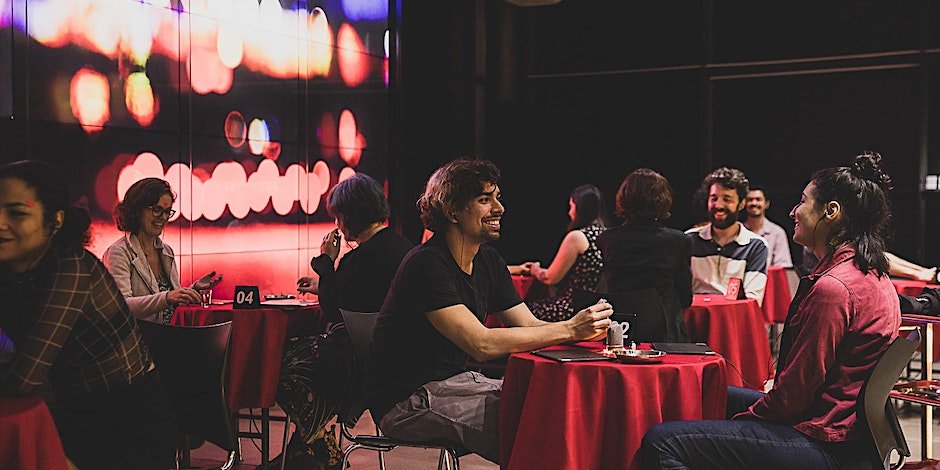Container is a new polyphonic performance, leaning heavily on the audio experience with the performers creating a beautiful soundscape that layers voices, effects, and musical instruments. The script is interesting; the idea being that these voices overlap and bombard, at times only one, but at times sounds and voices overwhelming the listener, much in the manner that information in the digital ages bombards us during our waking moments. As a piece of theatre, it is at times highly effective, but at times lacking specificity in the direction and purpose, resulting in moments that shine, weighed down by moments that feel indulgent. This is in no part due to the performances of the 5 company members, each of which are quite interesting to watch, and demonstrate exceptional range and skill in their vocal performance. Their outstanding vocal performances were truly something to behold. The idea of performing sounds in such an onslaught while not new (this was the central concept of my own MA dissertation over 10 years ago in response to Great Reckonings in Little Rooms’ central argument) is executed in an interesting manner, leveraging technology and music to create the cacaphony aligned with our own day to day experiences, bringing voice to the loneliness, and the simultaneous feeling of being overwhelmed.
Audio Plays
Binaural Dinner Date @ University of Greenwich
How do we get to know a person? How do we fall in love?
These are the central questions to the Binaural Dinner Date, a one-to-one guided audio performance mixed with live action. Audience members are paired up as if on a blind date, and guided through a series of activities to fall in love with one another; or are they? The journey itself isn’t particularly groundbreaking, but the technical prowess of the design and execution of the performance more than make up for this. Each individual has headphones, tables are on different cycles to interact with one another and with the Waiter, and these overlap so that at times all tables are silently watching a tertiary story with the waiter’s love.
In many ways, the success of this performance is just as reliant on your partner as it is on the production — which means it can fall down quickly. That said it is a technical marvel and worth experiencing if you have the chance.
Hate Radio by Milo Rau @ Battersea Arts Centre
This wasn’t easy to watch. Beginning with lengthy video recorded accounts from survivors of the atrocities humans committed against one another, of the fear and confusion that they experienced during the Rwandan Genocide, the play comes to the audience visually, but also through little shortwave radios with headphones. It is close, almost claustrophobic. It feels all the more personal and somehow simultaneously more private, yet more public. As it shifts to the live action - a glass box view into the recording studio with the equivalent of today’s “shock jocks” spewing hate while they dance around the studio and enjoy pop music of the time - the radio broadcast continues to be imperative. These voices and sounds are coming directly to us. They speak over one another; the surtitles (the production is performed predominantly in French but also in Kinyarwanda) lag behind what they are actually saying, so the English viewer gets only pieces. It is no less difficult to hear and watch.
These events took place in 1994, and whilst it would be nice to think that this sort of activity was isolated to the past, we now live in a time when this happens even more frequently — and more publicly — with twitter mobs, facebook misinformation, tv stations inciting violence and uprisings across the world. Watching this production now (it first debuted in 2012) it seems to argue that with more technology humans have only become more isolating, more hateful, ready to hurt those who disagree or whom they have decided are different. If that was true in 2012, it is only more so now in 2023. Where the production may have shocked 11 years ago, it now echoes.
Kudos to the performers of this difficult work. It is purposefully slow; nothing happens. At times your mind wanders, drifts, gets bored — all intentionally crafted. These activities shift into our subconscious, and then jolt us back, reminding us that they are here, in this world and we can’t let them become background noise we ignore. They are intensely harmful. At times the production is infuriatingly slow, in the best possible way, to achieve this awareness.
What Happens To You, Happens To Me by Susanna Fournier - Canadian Stage
This is a free audio experience you can listen to here, until August 1, 2020.
This fresh new isolation-inspired audio play from Susanna Fournier is an exploration of connection, of storytelling, of collaboration. We hear one voice (the delightful Kristen Thomson) inviting us to listen and connect with her. I listened to the audio-only version (there is also a version with video images if you prefer), and spent the approximately 16 minutes thinking through questions of time and hope, and more importantly, what comes next.
The piece asks audiences to engage with it, although the parameters of this are unclear. Many questions are asked, divided into chapters, but really it is the final question that is pressing and holds urgency.
Definitely worth checking out before it is gone.
Ritual - Podcast Plays from Dirty Protest Theatre & National Theatre Wales
Ritual is a series of 3 audio plays curated by Dirty Protest Theatre in Wales, with National Theatre Wales. You can listen to them via your favourite podcast service, details and links here.
I listened to these in order. In their materials, Dirty Protest indicate that their intent is for us to listen while we do our daily ritual - the laundry, the washing up, exercise - so I took them with me for some daily tasks.
Soaring by Hefin Robinson tells the story of two “penpals” who communicate with one another at the edge of the millennium, by mailing recorded tapes. A younger man and an older woman, on opposite parts of the country, communicate back and forth, reaching an intimacy between them despite being strangers, as they confess to one another, and work out their personal challenges. The story is captivating; I listened while out for a walk, and found myself completely immersed in the tension of the piece.
Double Drop by Lisa Jên Brown is the story of a young girl, wrestling with her own desire to be herself in the 90’s rave scene counterculture, yet finding her own actions at conflict with this desire to distance herself from her family’s reputation. What is really exciting about this piece is the pace at which it moves, and the way the beautiful compositions by 9Bloc drive the play forward. I listened to this one while out shopping, and found my own pace increasing with the intensity of the lead character, Esmi’s, energy and concern.
Unbound by Remy Beasly, focuses on two women. Funnily enough, although I listened to this one doing the least activity — sitting on my balcony enjoying a sunset — I somehow remember the least about the words and the story. That isn’t to say it wasn’t interesting, but something in the rhythm of the women’s conversation, the use of sound, lulled me into just thinking about that, and not the words or what was happening to the characters. It almost felt like I was overhearing a conversation nearby.
The trio of plays were recorded in the actor’s homes, and then edited together. The whole series is directed by Catherine Paskell. They are well worth taking a little time to check out, as the sound design and performances are fantastic, and the stories, especially Soaring, seem to mirror our own moment of separation from one another.
Chekhov's First Play - Dead Centre [Recorded - 2018]
I watched this in recording, from a 2018 performance in Dublin. Unfortunately it was a limited time, but follow Dead Centre in case they make it available again.
While it is performed live, the audience are provided headsets to listen; this is explained at the onset by the director, who tells us he wants to explain the symbolism and meaning of the production, which can be lost in Chekhov for modern audiences. The audience dutifully put their headphones on, and hear the director’s voice in their ear; first explaining things about Chekhov and the play, but shortly also critiquing the actors, explaining cuts, or complaining of errors. Just at the moment this begins to feel self indulgent, the set begins to fall apart (at one point a literal wrecking ball smashes bits) and the Chekhov that the director had tried so diligently to explain to us has itself fallen apart. We are left with snippets, moments, symbols, the precise opposite of the naturalism so often aligned with Chekhov’s writing, and so much clearer as a result.
I don’t want to give too much away, so won’t say much more, other than to offer a question regarding the audience member who is physically brought into the performance. Clearly this individual is pre-selected and receiving their instruction in a special headset — but what else is different about this individual’s experience? And how is their agency and willingness to be involved to such a degree mediated? Not knowing this, I was concerned about their opportunity to opt-in, to give consent to participate in this manner. Has anyone declined?
This was a really unique production which asks a lot of questions of its audience and material - but did leave me with some. That said, well worth seeing if you have the chance.
review. The Encounter @ Barbican London (via Live Stream) - Complicité
I often rant on about how theatre can be magical. This is a difficult rant, because for most people, the experience of truly magical theatrical experiences is just a myth. They've heard tell of it, but never truly been encompassed and transformed in the way that theatre has the capacity to do for us.
This can change.
Complicité are known for their genre-defying, technically stupendous work, so it is not surprising that when they set out to create an immersive play out of sounds, for which you sit with others but wear headphones, they succeeded in creating something truly magical. Written and performed by the company's leader, the astounding Simon McBurney, The Encounter is an audio experience -- but that doesn't do it justice. It is an overwhelming sensory experience, a new way of feeling a story, not just hearing or seeing it. It is a man and sound; nothing more. I won't say a ton, other than to let you know that you will not soon encounter anything quite like this.
Lucky for us, The Encounter isn't limited in space and time; thanks to technology, you can stream the recorded live stream from The Barbican in London for a week via Complicité's Youtube channel.
Do yourself a favour. Put on the headphones, turn everything else off, and immerse yourself for the 2 hours of The Encounter. I assure you, you will not regret it.
https://www.youtube.com/watch?v=ghc-DM1TVWU






